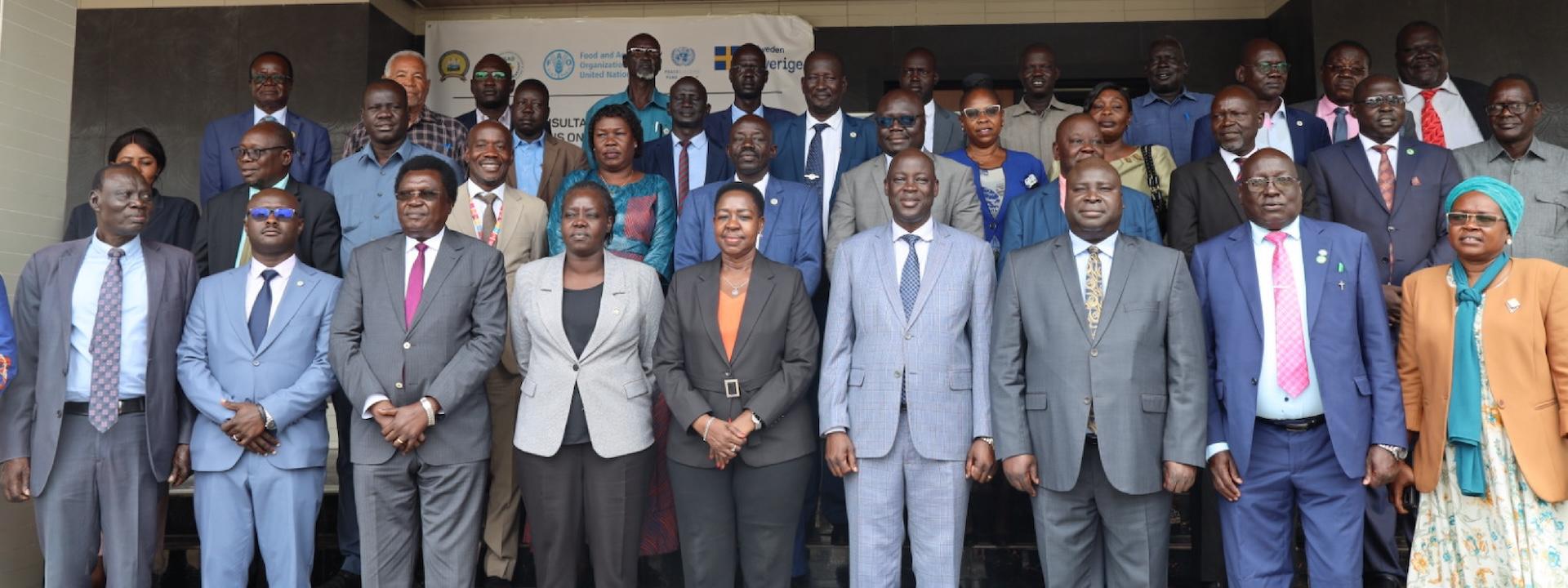July 11, 2024 (JUBA, South Sudan): Functional land administration systems cannot exist in the absence of inclusive national land policies defining national land sector goals and objectives. The Framework and Guidelines on Land Policy in Africa posit that the development of comprehensive national land policies is essential for both economic growth and sustainable human development. IGAD’s mandate to support Member States in their efforts to develop participatory and representative national land policies emanates from the AU Declaration on Land Issues and Challenges. Through the financial support from the Sweden Embassy in Addis Ababa and the Africa Union, IGAD has been supporting specific actions to finalise South Sudan’s National Land Policy development processes since 2021.
Since then, several notable milestones have been achieved, including the passing of the draft National Land Policy by the Council of Ministers on October 27, 2023, and the submission of the policy to the National Legislative Assembly in December 2023 for final approval. In May 2024, IGAD supported the Ministry of Lands, Housing, and Urban Development to conduct a consultative workshop for various parliamentary committees, political parties, and civil society organisations to create awareness and assure a comprehensive understanding of the contents of the draft National Land Policy. The workshop highlighted the need to engage all parliamentarians for the upcoming processes of reading, approval, and adoption by the National Legislative Assembly. This consensus-building workshop was conducted on July 10–11, 2024, in Juba with the aim of sensitising all parliamentarians to the draft national land policy and gathering wider stakeholder feedback and support for its approval and adoption.
During the two days’ workshop, the parliamentarians got useful insight on the draft policy through presentations and Q&A sessions and cleared most of their doubts on the draft policy. It was evident that consensus-building is not a one-time affair. But rather, it is a process that requires serious open and inclusive engagements, political negotiations, and consultations at all levels to reach common goals, build shared visions, understand the real issues, and agree to resolve them with mutual respect, nationalism, and genuine will to address the common interests of the people of South Sudan. As representatives of the people, the parliamentarians were committed to continuing the momentum of consultations with their respective constituencies to create awareness, ensure ownership, and gather constructive feedback. The participants also agreed to develop a roadmap with key recommendations and actions for the approval of the National Land Policy by the National Legislative Assembly. IGAD will continue to support the finalisation and eventual implementation of the draft national land policy, which will have paramount importance in driving economic development, ensuring equitable access to land, bringing sustainable peace, and contributing to effective national dialogue for South Sudan.
On behalf of IGAD Executive Secretary Dr. Workeneh Gebeyehu, IGAD Head of Mission to South Sudan, Mr. David Kwaje stated, Functional land administration systems cannot exist in the absence of adequate land policies defining national land sector goals and objectives. According to the Framework and Guidelines on Land Policy in Africa, comprehensive national land policy development should be seen as a prerequisite for economic growth and sustainable human development, and national ownership in the development of land policy is critical for engendering broad grass-roots endorsement, which is more likely to lead to successful implementation. To date, only two of the IGAD Member States, Kenya and Uganda, have comprehensive National Land policies.”
Objectives
The two-day workshop aimed to sensitise all parliamentarians on the national land policy document and orient them on the land policy, including fast-tracking its approval and adoption processes.
The main objective was to sensitise 650–100 MPs from the upper and lower houses of the national legislature on the national land policy document to gather wider stakeholder feedback and support for its approval and adoption by the National Legislative Assembly.
Outcomes
- 800 participants (parliamentarians from upper and lower houses) gained a thorough understanding of the draft National Land Policy, preparing them for its approval and adoption.
- A roadmap with key recommendations and actions for the approval of the National Land Policy by the National Legislative Assembly was adopted.
This collaborative effort between IGAD, FAO, and the Ministry of Lands, Housing, and Urban Development was a significant step towards establishing a comprehensive and gender-responsive land policy for South Sudan, ensuring equitable land governance and sustainable development for the nation.
Effective institutional arrangements were crucial for transforming land policies into practice and ensuring successful land administration systems.

